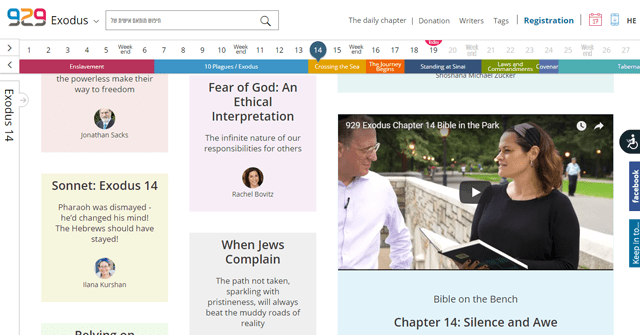 Introducing '929 English' ...
Introducing '929 English' ...
929 is the number of chapters in the Tanakh, the Hebrew Bible: from "In the Beginning" of Genesis chapter 1 through the Torah, the Prophets and all the Writings, to the end of II Chronicles.
929 was therefore chosen as the name of a project that began in Israel in 2014/5775: to read the Tanakh from cover to cover, one chapter a day − five per week. The reading (alone or in groups) was accompanied by a Hebrew website with creative content including audio and video, by a wide range of writers, artists, musicians. It includes readings, pluralistic interpretations and short commentaries by rabbis of all streams, government ministers, educators, army officers and more.
929 in English began this summer with Bereshit/Genesis. Melton’s Executive Director, Rabbi Rachel Bovitz, recently posted a piece on Shemot/Exodus 14. You can read her post below, but also check out the full 929 website for extensive content on the first two books of the Torah…so far!
Fear of God: An Ethical Interpretation (Shemot 14)
Had we been witness to all the events of the Exodus, fear and trust in God (Shemot 14:30) would be a given. We would have experienced first-hand the sea splitting, the drowning of an evil tyrant and his followers, Divine clouds moving to provide safety, and a leader, Moses, who guided by God instilled confidence and helped to deliver a stunning victory of good over evil.
The great faith message we take away from this passage is not a literal belief in what transpired, but rather a connection to the feelings this event engendered- fear and trust in God. For the Israelites, fear of God came in the wake of being overwhelmed by their miraculous deliverance, and trust emerged out of the ultimate experience of being cared for by God and a faithful leader.
My teacher, Rabbi Ira Stone, describes the meaning of Yirat HaShem (Fear of God) through the interpersonal ethical lens of mussar as “the overwhelming weight we take on when we recognize the infinite nature of our responsibilities for others.”[1] The connection between the events of the Exodus and this religious stance is an extreme sense of indebtedness. Just like our ancestors, until our last breath, we are indebted for our existence and our freedom. At the heart of Torah is the way we take this debt seriously, by the lifelong practice of loving our neighbor.
Trust is also understood as an active response to how we choose to experience life. The very same Israelites who felt so cared for after safely crossing the sea, struggled to retain their gratitude in the face of the challenges that followed. Like them, we easily fall prey to a moment in which we forget the goodness from our past as well as the present resources we can turn to for strength, wise counsel and comfort. Cultivating trust reminds us that even in difficult moments we need not be alone.
As we say at every seder, we too were redeemed from Egypt. Within us is the fear and the trust in God ready to be awakened and acted upon.
https://www.929.org.il/lang/en/page/64/post/41733
[1] Stone, Ira, Mesillat Yesharim: The Path of the Upright Commentary, (Philadelphia, The Jewish Publication Society, 2010) p.10.
{snippet Rachel-tagline}
